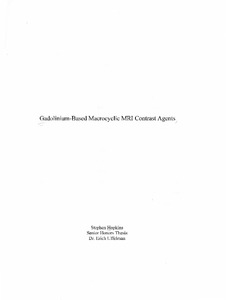| dc.rights.license | In Copyright | en_US |
| dc.creator | Hopkins, Stephen Day | |
| dc.date.accessioned | 2023-10-20T18:00:50Z | |
| dc.date.available | 2023-10-20T18:00:50Z | |
| dc.date.created | 2000 | |
| dc.identifier | WLURG038_Hopkins_thesis_2000 | |
| dc.identifier.uri | https://dspace.wlu.edu/handle/11021/36454 | |
| dc.description.abstract | The early detection of diseased and cancerous cells leads to a dramatic increase in the survival rate of the patients. The limitations of magnetic resonance imaging (MRI) to differentiate many types of cancerous tissues from healthy tissue has led to a new pharmaceutical field. This new field aims to develop new metal complexes responsible for increasing the ability of MRI to detect the tumor. These paramagnetic metal-based complexes create a contrast between tumor tissue and healthy tissue. The first approved gadolinium-based macrocyclic contrast agent, [Gd(DOTA)L] created an effective contrast while remaining stable in vivo. Much research has been directed towards improvement of this complex through modification of the ligand. In addition to research towards the betterment of the [Gd(DOTA)] complex, many research groups have focused on the development of novel gadolinium complexes. Two such complexes, the [Gd(Texaphyrin)]2+ complex and the [Gd(PCTA)] complex, have been shown to provide an increased contrast. These two complexes represent the most recent advances in contrast agent technology. Research in the Uffelman group centers on the development of a novel MRI contrast agent by expanding the coordination chemistry of lanthanide ions to amido-N ligands. The group has successfully synthesized a H4 pentadentate tetraamide macrocycle through a new, less dangerous intermediate. Significant steps have been taken towards the completion of an hexadentate tetraamide macrocycle. This larger ligand may have a greater chance of binding a lanthanide series ion. | en_US |
| dc.format.extent | 70 pages | en_US |
| dc.language.iso | en_US | en_US |
| dc.rights | This material is made available for use in research, teaching, and private study, pursuant to U.S. Copyright law. The user assumes full responsibility for any use of the materials, including but not limited to, infringement of copyright and publication rights of reproduced materials. Any materials used should be fully credited with the source. | en_US |
| dc.rights.uri | http://rightsstatements.org/vocab/InC/1.0/ | en_US |
| dc.subject.other | Washington and Lee University -- Honors in Chemistry | en_US |
| dc.title | Gadolinium-Based Macrocyclic MRI Contrast Agents | en_US |
| dc.type | Text | en_US |
| dcterms.isPartOf | WLURG038 - Student Papers | en_US |
| dc.rights.holder | Hopkins, Stephen Day | en_US |
| dc.subject.fast | Gadolinium | en_US |
| dc.subject.fast | Diagnostic imaging | en_US |
| dc.subject.fast | Magnetic resonance imaging | en_US |
| local.department | Chemistry | en_US |
